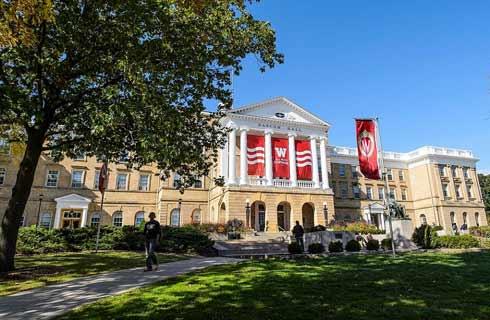Doctor of Philosophy in Culture and Theory

学历文凭
Ph.D.

专业院系
Culture and Theory

开学时间

课程时长

课程学费

国际学生入学条件
Applicants must have earned a bachelor’s, master’s, or equivalent degree in any discipline in the humanities, arts, or social sciences.
TOEFL Score Requirements for Admission Consideration:
- On the TOEFL iBT minimum score of 80
- For the paper-based test, a minimum score of 550
IELTS Score Requirements for Admission Consideration:
- An overall minimum score of 7 for admission, with a score of no less than 6 on any individual module.
- Applicants who qualify for admission by the above criteria, and also achieve a score of 8 or higher on the Speaking module may be eligible to serve as a Teaching Assistant.
IDP—雅思考试联合主办方

雅思考试总分
7.0
- 雅思总分:7
- 托福网考总分:80
- 托福笔试总分:550
- 其他语言考试:The minimum score for PTE is 53
CRICOS代码:
申请截止日期: 请与IDP联系 以获取详细信息。
课程简介
相关申请
 预科
预科 奖学金
奖学金 实习机会
实习机会 在校学习
在校学习 跨境学习
跨境学习 校园授课-线上开始
校园授课-线上开始 在线/远程学习
在线/远程学习
开学时间&学费
学费信息仅供参考,请与IDP联系以获取详细信息
| 开学时间 | 时长 | 学费 | 地点 |
|---|
学校排名

世界排名96
数据源:
泰晤士高等教育世界大学排名
关于加州大学欧文分校

加州大学欧文分校(University of California Irvine)在最优秀的100所建校历史不足50年的学校中排名全美第一,世界第五,其既有大型科研学校的教学实力,也有小型院校的友好氛围。风景优美的校园,良好的治安,雄厚的师资力量,丰富的课外活动都是加州大学欧文分校(University of California Irvine)所具备的,此外,学生的领导力能力也会在此得到提升,还有诸多优秀的研究生专业包括医药学、护理学、法律、商学、工程学、人文学科。加州大学欧文分校(University of California Irvine)有三名研究人员被授予诺贝尔奖,三名学生被授予普利策奖,三名教师被授予美国国家科学奖。学校的老师会尽力给与学生研究指导和帮助。87%的大四学生都参与了研究项目。加州大学欧文分校(University of California Irvine)的教育为学生将来的就业打下了良好的基础,学校的就业中心会举办丰富的活动帮助学生就业,例如研究生院校的招生活动和招聘会活动,还会指导学生如何制作简历,在校内举办面试。一切活动都为了帮助学生毕业后更好的就业。 加州大学欧文分校(University of California Irvine)共有100多项研究生专业,因此学生在毕业时已经具备了良好的分析、表达、理解能力。根据PayScale2013-2014年度的大学生薪资调查报告显示,该校毕业生的薪资在美国公立大学中排名第14位。无论学生毕业后想继续攻读研究生院还是直接就业,学校提供给他们的帮助与资源支持都为他们毕业后的发展打下了良好的基础。
本校相关课程

Doctor of Philosophy in Sociology
学历文凭
Ph.D.
开学日期
课程费用总额


Doctor of Philosophy in Political Science
学历文凭
Ph.D.
开学日期
课程费用总额


Doctor of Philosophy in Social Science - Mathematical Behavioral Sciences
学历文凭
Ph.D.
开学日期
课程费用总额


Doctor of Philosophy in Economics
学历文凭
Ph.D.
开学日期
课程费用总额


Doctor of Philosophy in Anthropology
学历文凭
Ph.D.
开学日期
课程费用总额


Doctor of Philosophy in Physics
学历文凭
Ph.D.
开学日期
课程费用总额

其他相关课程

妇女和性别研究文学士学位(3年)
 劳伦森大学
劳伦森大学学历文凭
Bachelor Degree
开学日期
课程费用总额


性别与妇女研究文学士学位
 特伦特大学
特伦特大学学历文凭
Bachelor Degree
开学日期
课程费用总额


文化研究文学士
 特伦特大学
特伦特大学学历文凭
Bachelor Degree
开学日期
课程费用总额


妇女研究和社会学(荣誉)社会科学学士学位
 渥太华大学
渥太华大学泰晤士高等教育世界大学排名:188
学历文凭
Bachelor Degree with Honours
开学日期
课程费用总额


妇女研究和政治科学(荣誉)社会科学联合学士学位
 渥太华大学
渥太华大学泰晤士高等教育世界大学排名:188
学历文凭
Bachelor Degree with Honours
开学日期
课程费用总额


妇女研究社会科学学士学位
 渥太华大学
渥太华大学泰晤士高等教育世界大学排名:188
学历文凭
Bachelor Degree
开学日期
课程费用总额










 美国
美国